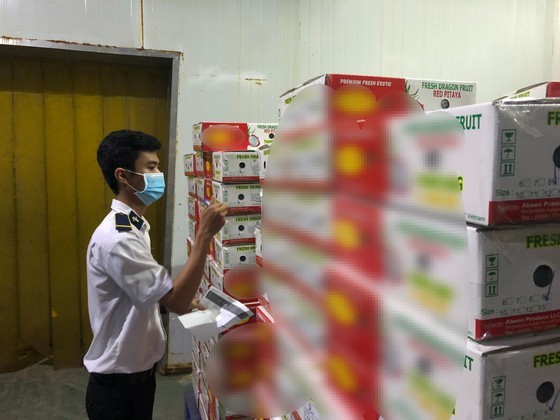 |
Quarantine inspector inspects at an agricultural warehouse before export. |
Long waiting time
According to a cashew exporting company, the cashew market is experiencing a significant slowdown. However, businesses have encountered challenges and higher expenses when bringing raw cashews to their warehouses. In the past, when raw cashews arrived at Cat Lai Port in Ho Chi Minh City, companies only needed to submit a Plant Protection Department's plant quarantine registration form. Afterward, personnel would come to collect samples, perform inspections, and handle the customs clearance process.
Since the start of 2023 up to the present, the inspection agency has introduced a new process that includes conducting sample inspections at the port before customs clearance. While regulations dictate that plant quarantine should be finalized within 24 hours, in practice, it typically takes 3-4 days. In certain situations, such as when it falls on a Friday or holiday, goods may remain at the port for 5-6 days, resulting in heightened container and yard storage expenses.
Conversely, as for exports, products must undergo inspections at the company's warehouse before being transported to the port. According to Mr. Vu Thai Son, Chairman of the Cashew Association in Binh Phuoc Province, the province has dozens of factories. If inspectors are required to visit all these factories, it would be a time-consuming process. Binh Phuoc Province falls under the jurisdiction of the Region-II Plant Quarantine Sub-Department under the Ministry of Agriculture and Rural Development (MARD).
However, due to a shortage of personnel, they have delegated the responsibility of collecting samples for cashew exports to the plant quarantine inspectors at the Hoa Lu Border Gate, which is situated far from areas with a high concentration of businesses and lacks adequate staff to carry out inspections promptly.
In the past, in order to export, companies were obliged by their partners to undergo quality inspections to check for pests or insects in their products, performed by independent entities like Vinacontrol, Cafecontrol, SGS, and BV. As part of the process, these units would randomly collect samples from at least 10 percent of the batch and subsequently conduct an analysis and inspection of these samples. Importers only make payments for their orders upon receiving a certificate of qualified sampling from an independent certification unit.
Mr. Vu Thai Son stated that having an inspection by the importing unit alone is adequate, and having two inspection agencies for one batch is unnecessary and wasteful.
Likewise, numerous businesses involved in raw wood imports also need to wait for inspections at the port. Since each wood shipment typically consists of many containers, an extended stay at the port substantially escalates production costs for these companies.
Considering waiving quarantine for some items
In an interview with SGGP Newspaper, Mr. Nguyen Vu Phi Long, Director of Region-II Plant Quarantine Sub-Department, said that as per the Law on Plant Protection and Quarantine, Food Safety Law, and Circular No.33/2014 from the MARD, imported plant products are mandated to undergo quarantine at the first port of entry. In the past, since there were no unusual weather changes, harmful organisms in imported goods did not have the ability to spread widely but were frequently confined to containers. Hence, the sub-department facilitated conditions for businesses to transport their goods to warehouses and conduct inspections at a later time.
Presently, harmful organisms within imported goods can potentially propagate at any moment, which is why inspections at the port are mandatory. The Region-II Plant Quarantine Sub-Department is accountable for overseeing 13 provinces, managing 70 percent of the goods imported and exported in the Southern region. At the port, on average, an inspector conducts inspections and collects samples from more than 30 shipments per day. However, if the goods are stored in bonded warehouses, inspectors can only process one shipment per day. Not to mention that the sub-department's workforce is presently reduced.
As stated by Mr. Nguyen Vu Phi Long, the management software shows that no shipment has undergone sampling for more than 24 hours, except for those with missing documents. Furthermore, upon arrival at the port, shipments often have to wait for the port's loading and unloading team to transport them to the quarantine agency for acceptance. It is important to note that loading and unloading services fall under the jurisdiction of the port, not the quarantine agency.
The inspection staff work on weekends and during holidays to accommodate the needs of businesses. Nevertheless, enterprises expecting shipments to arrive on days preceding holidays or weekends must provide prior notification so that the sub-department can organize personnel to ensure the timely issuance of certificates.
Meanwhile, according to Mr. Le Son Ha, Head of the Plant Quarantine Department under the Department of Plant Protection, MARD, if harmful organisms are detected when products are brought to the warehouse, it results in additional expenses for businesses to dispose of them. Some countries do not mandate quarantine inspections by entities like Vinacontrol, Cafecontrol, SGS, and BV. Therefore, agricultural exporters should research the regulations of the importing country to prevent unnecessary quarantines.
Moreover, certification units solely document pest infestations, while the Plant Protection Department conducts inspections for all the prohibited organisms listed in various countries' catalogs, as well as Vietnam's catalog. For processed cashews, the risk of infection is extremely low, almost negligible. Thus, the current inspection procedure is deemed unnecessary. The Plant Protection Department will contemplate suggesting to the MARD to exclude pre-processed cashews and some other agricultural items from the compulsory inspection list, if there is no risk, to facilitate favorable conditions for businesses.
























